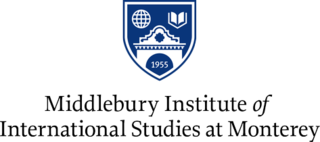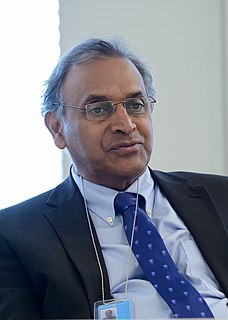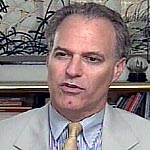Related Research Articles

The Treaty on the Non-Proliferation of Nuclear Weapons, commonly known as the Non-Proliferation Treaty or NPT, is an international treaty whose objective is to prevent the spread of nuclear weapons and weapons technology, to promote cooperation in the peaceful uses of nuclear energy, and to further the goal of achieving nuclear disarmament and general and complete disarmament. Between 1965 and 1968, the treaty was negotiated by the Eighteen Nation Committee on Disarmament, a United Nations-sponsored organization based in Geneva, Switzerland.

The Pugwash Conferences on Science and World Affairs is an international organization that brings together scholars and public figures to work toward reducing the danger of armed conflict and to seek solutions to global security threats. It was founded in 1957 by Joseph Rotblat and Bertrand Russell in Pugwash, Nova Scotia, Canada, following the release of the Russell–Einstein Manifesto in 1955.
Robert L. Gallucci is an American academic and diplomat, who formerly worked as president of the John D. and Catherine T. MacArthur Foundation. He previously served as dean of the Edmund A. Walsh School of Foreign Service at Georgetown University, from 1996 to June 2009. Prior to his appointment in 1996, for over two decades he had served in various governmental and international agencies, including the Department of State and the United Nations.

Jon Wolfsthal is an American national security consultant, government appointee, and columnist.
CRDF Global is an independent nonprofit organization that promotes safety, security, and sustainability through science and innovation. CRDF Global was authorized by the U.S. Congress in 1992 under the FREEDOM Support Act and established in 1995 by the National Science Foundation. This unique public-private partnership promotes international scientific and technical collaboration through grants, technical resources, and training. CRDF Global was originally named the U.S. Civilian Research and Development Foundation for the Independent States of the Former Soviet Union (CRDF).

The Middlebury Institute of International Studies at Monterey (MIIS), formerly known as the Monterey Institute of International Studies, is an American graduate school of Middlebury College, a private college in Middlebury, Vermont.
Joseph Cirincione is a distinguished fellow at the Quincy Institute for Responsible Statecraft in Washington, D.C. He previously served for over 12 years as the president of the Ploughshares Fund, a public grant-making foundation focused on nuclear nonproliferation and conflict resolution.

The United Nations Institute for Disarmament Research (UNIDIR) was established in 1980 by the United Nations General Assembly to inform States and the global community on questions of international security, and to assist with disarmament efforts so as to facilitate progress toward greater security and economic and social development for all.

Jayantha Dhanapala is a Sri Lankan diplomat who serves as member of the Board of Sponsors of The Bulletin of the Atomic Scientists and was a governing board member of the Stockholm International Peace Research Institute. Dhanapala is also a distinguished member of Constitutional Council and he is the Senior Special Advisor on Foreign Relations to President Maithripala Sirisena, and was Sri Lanka's official candidate for the post of Secretary-General of the United Nations, before withdrawing from the race on 29 September 2006. From 2007 he has been the President of the Pugwash Conferences on Science and World Affairs.

Patricia Lewis is a British and Irish nuclear physicist and arms control expert, who is currently the Research Director for International Security at Chatham House. She is also currently Co-Director of the Global Commission on Internet Governance. She was previously the Senior Scientist-in-Residence and Deputy Director at the James Martin Center for Nonproliferation Studies at Monterey Institute of International Studies (MIIS). She was previously the Director of the United Nations Institute for Disarmament Research (UNIDIR) and the Director of VERTIC.

James Eugene Goodby is an author and former American diplomat.

Jonathan Granoff is an American lawyer, screenwriter and lecturer, widely known as President of the Global Security Institute.

Henry D. Sokolski is the Executive Director of the Nonproliferation Policy Education Center, a Washington-based nonprofit organization founded in 1994 to promote a better understanding of strategic weapons proliferation issues among policymakers, scholars, and the media. He teaches as an adjunct professor at The Institute of World Politics in Washington, D.C. and at the University of Utah and has an appointment as Senior Fellow for Nuclear Security Studies at the University of California at San Diego, School of Global Policy and Strategy.

Yukiya Amano was a Japanese diplomat and the Director General of the International Atomic Energy Agency (IAEA). Amano previously served as an international civil servant for the United Nations and its subdivisions.

Rose Eilene Gottemoeller is an American diplomat who served as Deputy Secretary General of NATO from October 2016 to October 2019 under Secretary General Jens Stoltenberg. She previously served as Under Secretary of State for Arms Control and International Security at the U.S. State Department.
The International Luxembourg Forum on Preventing Nuclear Catastrophe — is an international non-governmental organisation uniting leading world-renowned experts on non-proliferation of nuclear weapons, materials and delivery vehicles.
The 2010 Review Conference for the Treaty on the Non-Proliferation of Nuclear Weapons (NPT) was held at United Nations Headquarters in New York City from 3 to 28 May 2010. The President of the Review Conference is Ambassador Libran N. Cabactulan of the Philippines. UN Secretary-General Ban Ki-moon used the opening of the conference to note that "sixty five years later, the world still lives under the nuclear shadow".

Ambassador Ronald Frank Lehman II is currently Director of the Center for Global Security Research at the United States Department of Energy's Lawrence Livermore National Laboratory. He is also Chair of the Governing Board of International Science and Technology Center, an intergovernmental organization headquartered in Moscow and is a member of the Department of Defense Threat Reduction Advisory Committee.
Ambassador Thomas Graham Jr. is a former senior U.S. diplomat. Graham was involved in the negotiation of every single international arms control and non-proliferation agreement from 1970 to 1997. This includes the Strategic Arms Limitation Talks, the Strategic Arms Reduction Treaties, the Anti-ballistic missile (ABM) Treaty, Intermediate-Range Nuclear Forces Treaty (INF) Treaty, Treaty on the Non-Proliferation of Nuclear Weapons Treaty (NPT), Treaty on Conventional Armed Forces in Europe (CFE) Treaty and Comprehensive Nuclear-Test-Ban Treaty (CTBT). In 1993, Ambassador Graham served as acting director of the Arms Control and Disarmament Agency (ACDA) from January to November, 1993 and Acting Deputy Director from November, 1993 to July, 1994. From 1994 through 1997, he was president Bill Clinton's special representative for Arms Control, Non-Proliferation, and Disarmament. Graham successfully led the U.S. government efforts to achieve the permanent extension of the NPT in 1995. Graham also served for 15 years as the general counsel of ACDA. Throughout his career, Thomas Graham has worked with six U.S. Presidents including Presidents Richard Nixon, Gerald Ford, Jimmy Carter, Ronald Reagan, George H. W. Bush, and Bill Clinton. Ambassador Graham worked on the negotiation of the Chemical Weapons Convention and the Biological Weapons Convention and managed the Senate approval of the ratification of the Geneva Protocol banning the use of chemical and biological weapons in war, as well as the Biological Weapons Convention.

Dr. Alexei Georgievich Arbatov, PhD is a full member of the Russian Academy of Sciences, the Head of the Center for International Security at the Institute of World Economy and International Relations (IMEMO), and a scholar in residence at the Carnegie Moscow Center. He is a Russian political scientist, academic, author, and former politician.
References
- ↑ "Career at a Glance" (PDF). Jayantha Dhanapala. Retrieved April 8, 2017.